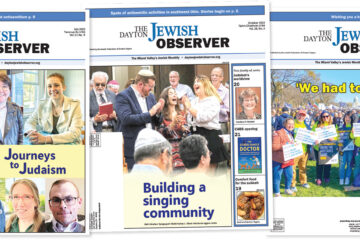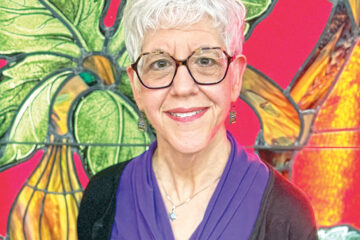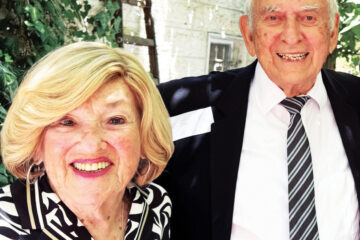Mangel family patriarch survived Auschwitz at age 10. At 90, he returned with three generations of descendants.
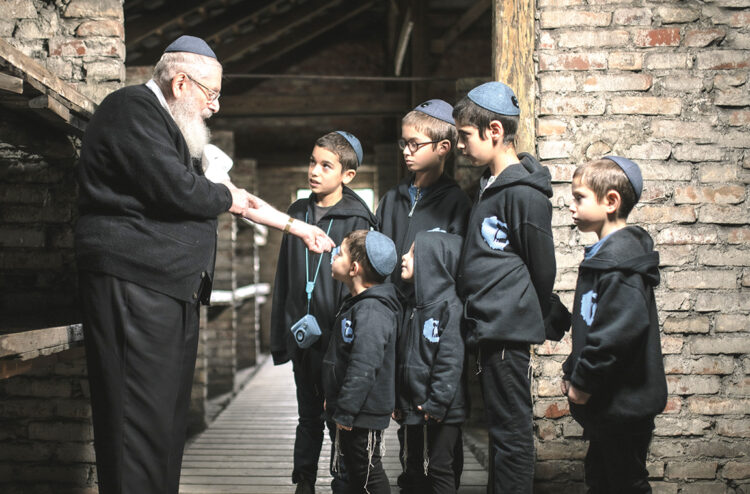
By Marshall Weiss, The Dayton Jewish Observer
When Rabbi Nissen Mangel was 10 years old, he made it out of Auschwitz alive. He made it past the “Angel of Death,” Dr. Josef Mengele. He survived the brutal death march in January 1945 just before liberation. None of his other relatives in Auschwitz — including his father — made it out alive.
Nearly 80 years later, the boy who survived Auschwitz returned there to celebrate his 90th birthday with his wife, children, grandchildren, and great-grandchildren — nearly 100 people in all.
A noted scholar and author in the Chabad-Lubavitch movement, Rabbi Nissen Mangel is the father of Rabbi Nochum Mangel, director of Chabad of Greater Dayton.
“My father, his entire life, was never bitter,” Nochum Mangel says. “Never angry. No nightmares. This is how he saw it: it’s a gift from God that he survived. He doesn’t know why God chose him, but he’s going to make the most of his life.”
The children, grandchildren, and great-grandchildren came together from Ohio, Florida, Colorado, New Jersey, Georgia, New York, Italy, and Israel.
“He always wanted that we should see the hell that he survived,” Nochum Mangel says. “And, that Judaism is never doomed.”
Their first stop was Lizhensk, Poland to visit the grave of Rabbi Elimelech of Lizhensk, one of the founding rabbis of Chasidism.
“My father is a direct descendent of Rabbi Elimelech of Lizhensk,” Nochum Mangel says. “It was important to him to go to his grave.”
Devorah Leah Mangel, Nochum Mangel’s wife and Chabad of Greater Dayton’s women’s program director, says the day the family visited Auschwitz, there were about a thousand other visitors there.
“And they were staring at us, just because of our numbers and because nobody else had kids,” she says.
Other than two 2-year-olds who stayed back with other family, all of Nissen Mangel’s great-grandchildren were there.
“My father did ask the question, what’s the point of bringing 7-year-olds? How are they going to appreciate what’s happening?” Nochum Mangel says. “The argument was that this is for the future. Even if you have a 3-year-old who doesn’t understand what’s going on, he’s going to be standing in a picture. He’s going to see that picture, and he’s going to hear stories about these pictures, and he’s going to hear stories about his great-grandfather and then he’ll say, ‘I was there and here’s the picture.'”
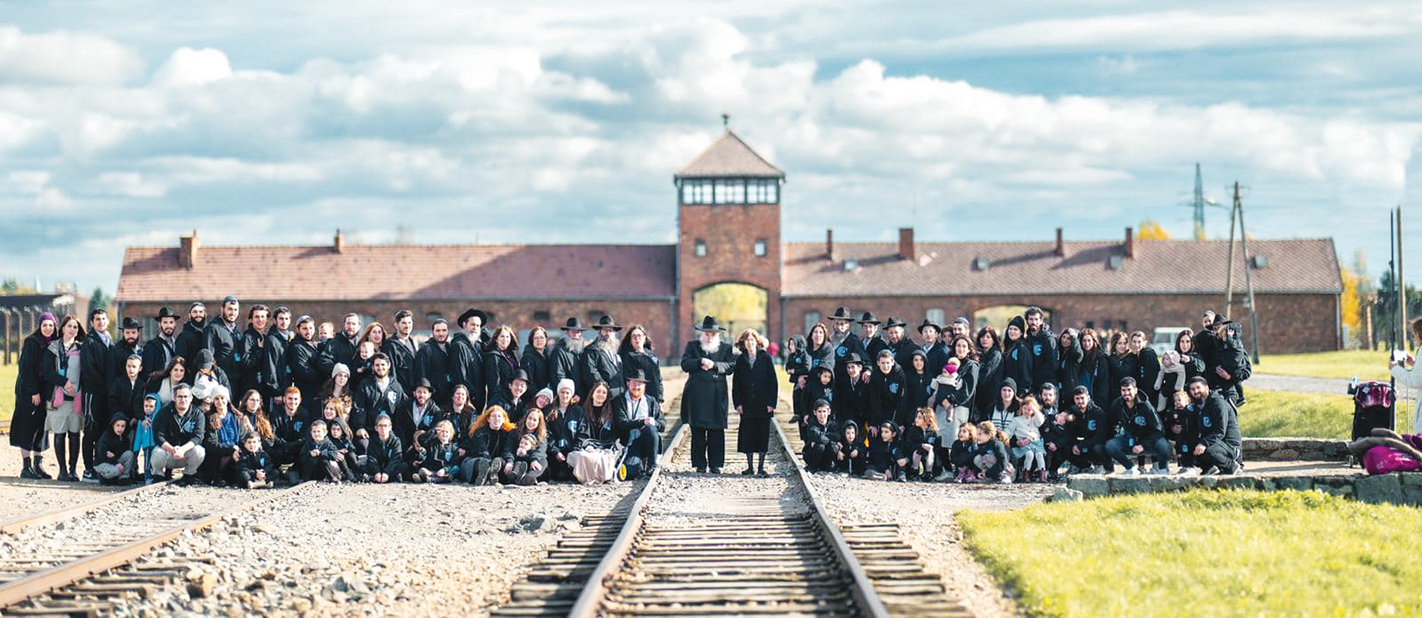
Devorah Leah Mangel says it was powerful to see the great-grandchildren constantly at her father-in-law’s feet.
“At Auschwitz, they were standing by him and taking in every single word he had to say,” she says. “Wherever we went, they were constantly surrounding him and just taking it all in. These children will really, really one day pass it on to their children, to make sure we never forget the Holocaust.”
The Mangel family did consider calling off the trip a few weeks before they departed, because of the Oct. 7 massacre, the ensuing Israel-Hamas war, and the worldwide explosion of antisemitism along with it.
“My brother in Cherry Hill knows somebody whose brother is the head of security of the Israeli embassy in Warsaw,” Nochum Mangel says. “So we asked him. What he said was, ‘Just don’t post any pictures where you are. Don’t let anyone know where you are. Once you’re gone, then you can post pictures.'”
The family decided it was important to go now, more than ever.
“Because my father’s message all his life was, “Hodu l’Hashem ki tov, ki l’olam chasdo (Psalm 136), thanking Hashem for the goodness and kindness that He bestowed upon him. That’s how he tells his story.”
Devorah Leah Mangel adds that the great-grandchildren all learned Nissen Mangel’s message from Psalm 136 before the trip and were singing it the whole time.
“Wherever it was, we danced and sang my father’s theme song, Hodu l’Hashem ki tov, and also about the future, L’Shanah Haba’ah B’Yerushalayim (next year in Jerusalem), Am Yisrael Chai (the Jewish people lives), Vehi She’amda,” Nochum Mangel says.
Vehi She’amda is a passage in the Haggadah that is recited at the Passover Seder: “And this is what kept our fathers and what keeps us surviving. For, not only one arose and tried to destroy us, rather in every generation they try to destroy us, and Hashem saves us from their hands.”
The family, Nochum Mangel says, intentionally chose songs about the past, present, and future of Judaism.
“Jewish atrocities, for us, are a granted, a given. That we survive, that is the miracle. Therefore, we are singing.”
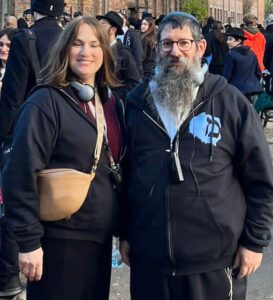
“We’re celebrating the survival of one,” Devorah Leah Mangel notes. “And what kept on going through my mind is that this is one. But for each of the 6 million, you realize how many we lost.”
“That’s 6 million individuals,” Nochum Mangel adds. “And look what could have happened: 100 people came from one individual. So you could imagine what could have come from 6 million. At all times, these dual feelings are in all of our minds.”
This was Nissen Mangel’s fourth return to Auschwitz. Though family members were concerned about how his emotional state might be on this trip at age 90, he was in the mood to celebrate.
“He walks triumphantly, talking and showing where things happened,” Nochum Mangel says.
“They treat survivors with great respect today. They gave him a golf cart, so they don’t have to walk. My father goes into that, and he has a smile from ear to ear. And he’s waving to everybody.”
At the site where Dr. Josef Mengele selected Nissen Mangel out of the line to the gas chambers, the patriarch pointed and recited the prayer, “She’asah li nes b’makom hazeh,” that God performed a miracle for me right here. Then, his progeny made the blessing as well.
Nissen Mangel showed his great-grandchildren the barracks where he slept.
“He says, ‘In the barracks, six of us were lying in bed. How many of you can lie on this bed?'” Nochum Mangel relates of his father.
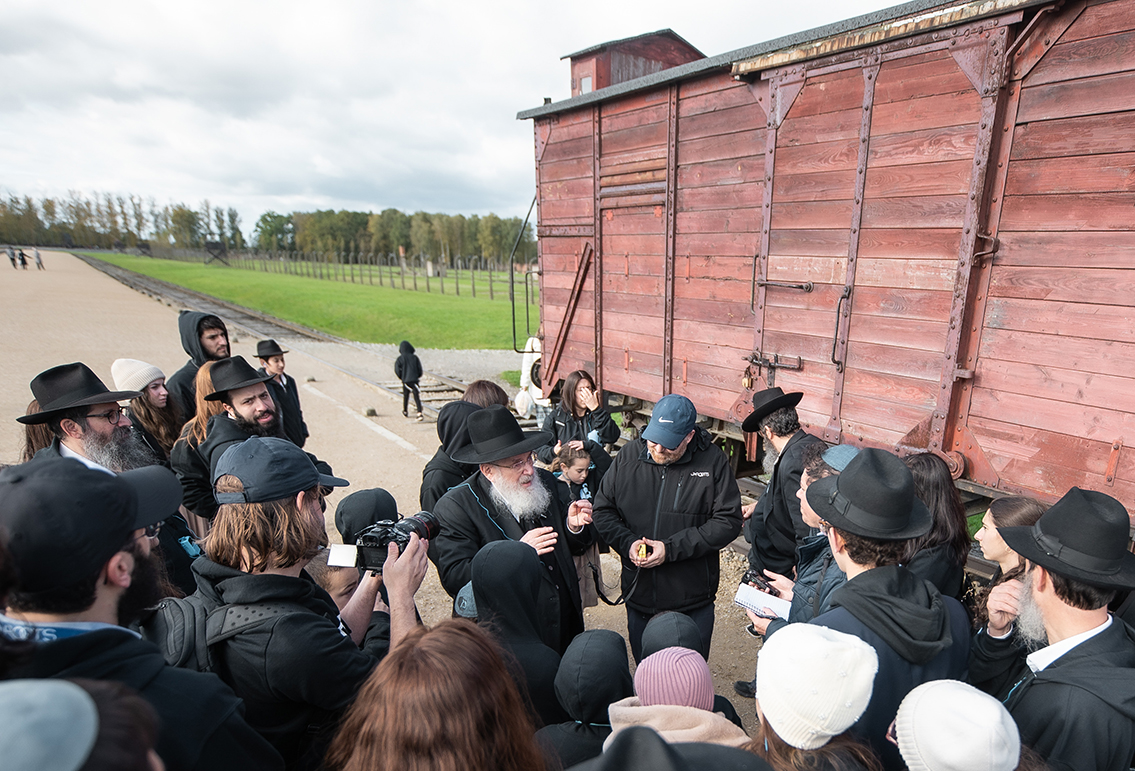
“He can take one of his grandchildren and say, ‘This is how tall I was. This is how old I was.’ It became very real. Even for me. You could see him in those kids.”
Yad Vashem, Israel’s memorial to the victims of the Holocaust, displays an installation at Auschwitz with the names of all victims who were killed there, along with the cities they came from. There, Nissen Mangel found his father’s name with those of other relatives.
“The message wherever my father spoke was, no Jew is ever alone. God is with every single Jew. You can overcome the hardest things in your life,” Nochum Mangel says.
“I would say the sad reality is that we cannot rely on the world. Antisemitism lives on. And we see it in our lifetime. The exact same nonsense. The exact same lies. We’ve got no one else to rely on but God. And it happens throughout Jewish history. And we’re going to survive. We’re going to take shots. We’re going to be hurt. But ultimately, nobody’s going to be able to destroy us.”
To read the complete December 2023 Dayton Jewish Observer, click here.


